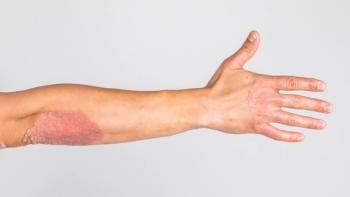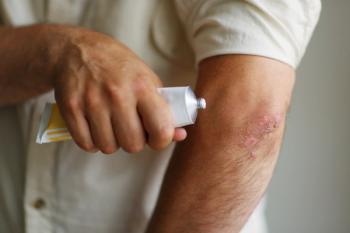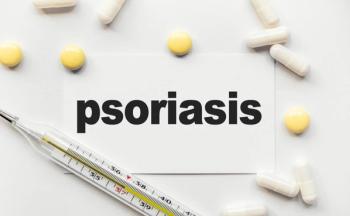
Identifying Psychological Burdens in Non–Plaque Psoriasis
Key Takeaways
- PsA and PPP are associated with high rates of depression, anxiety, and sleep disturbances, impacting disease severity and treatment adherence.
- A systematic review of 17 studies found depression prevalence in PsA ranged from 7.1% to 41%, and in PPP from 5.7% to 17.1%.
New findings reveal high rates of depression, anxiety, and sleep issues in individuals with psoriatic arthritis and palmoplantar psoriasis.
Significant rates of depression, anxiety, and sleep disturbances in patients with psoriatic arthritis (PsA) and palmoplantar psoriasis (PPP) were identified, underscoring the need for integrated mental health screening and support for individuals with these
This systematic review is published in the
“There is substantial evidence assessing the relationship between plaque psoriasis and psychological comorbidities; however, no comprehensive analysis specifically focusing on rarer psoriasis subtypes or PsA currently exists,” wrote the researchers of the study. “This systematic review aims to identify and characterize the psychological comorbidities associated with rare psoriasis subtypes to better understand their impact on mental health and inform future research and clinical management strategies.”
Psoriasis imposes a substantial psychosocial burden that extends beyond visible skin symptoms.2 Patients often experience depression, anxiety, social stigma, and diminished quality of life, regardless of disease severity. These psychological challenges may worsen disease outcomes by reducing treatment adherence and fueling a cycle of physical and mental health decline. Addressing this burden requires a patient-centered approach that integrates mental health support alongside dermatologic care.
A comprehensive literature search was conducted across Medline, Embase, PsycINFO, and PubMed databases up to February 2025 to identify studies examining psychological comorbidities in non-plaque psoriasis subtypes.1 Search terms included combinations of “palmoplantar psoriasis,” “psoriatic arthritis,” “psychological comorbidities,” “depression,” “anxiety,” and related terms. Eligible studies included observational or clinical research that reported the prevalence or severity of psychological conditions in adults with non-plaque psoriasis. Data were extracted on study design, population characteristics, measures of psychological outcomes, and disease severity indices.
Seventeen studies encompassing 76,567 patients met the inclusion criteria, with data available only for PsA and PPP. In PsA, the prevalence of depression ranged from 7.1% to 41%, while in PPP, it ranged from 5.7% in Japan to 17.1% in the US. Anxiety prevalence was reported between 5.1% and 61.4% across both conditions.
Higher disease activity was strongly associated with increased psychological burden, in which patients with depression were over 4 times more likely to experience greater disease severity (AOR, 4.43; P = .001). Sleep disturbances were noted in up to 38% of patients, and mood disorders were reported in 19.6% of PPP cases. Functional impairment ranged from mild to moderate, with pain contributing to variable levels of discomfort.
However, the researchers acknowledged some limitations, including heterogeneity in populations, diagnostic criteria, and psychological assessment tools. PsA was well represented, but rarer forms like palmoplantar pustular, erythrodermic, and guttate psoriasis were not. Variations in assessment methods and biologic treatment access may have influenced prevalence estimates. Lastly, most studies were cross-sectional, limiting causal conclusions, and potential bias and underreporting further constrained the findings.
Despite these findings, the researchers believe the results indicate that both PsA and PPP are associated with substantial psychological comorbidities that worsen with disease severity.
“Despite significant distress in PsA and palmoplantar pustular psoriasis, current screening practices remain inadequate,” wrote the researchers. “Future studies should explore long-term outcomes and assess intervention strategies to advance comprehensive, patient-centered management of psoriasis and its psychological comorbidities.”
References
1. Peri K, Ibude EA, Tran JVH, et al. Psychological comorbidities in palmoplantar psoriasis and psoriatic arthritis: A systematic review. J Cutan Med Surg. 2025:12034754251386789. doi:10.1177/12034754251386789
2. Steinzor P. Clinical severity may not correlate with psychological burden of psoriasis, study finds. AJMC®. May 7, 2025. Accessed November 10, 2025.
Newsletter
Stay ahead of policy, cost, and value—subscribe to AJMC for expert insights at the intersection of clinical care and health economics.









